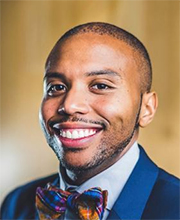
Editor’s Note: In September 2020, Rotary formed a task force charged with assessing the current status of diversity, equity, and inclusion (DEI) in Rotary and shaping a comprehensive action plan to help us further value and live those principles throughout the organization. This is the third in a series of blog posts from DEI Task Force members reflecting on their work on the committee and why it is critical for the organization.
Dr. “Bowtie” Todd Jenkins serves as a Global Diversity, Equity, and Inclusion Leader at a Fortune 100 company in Corporate America and as an Executive Inclusion Trainer, Strategist, and Speaker with Bowtie Leadership, Inc. Todd is a member of the Rotary Club of Fayetteville, Arkansas; and has served as a Rotaract Advisor, Interact Sponsor, RYLA presenter, and Youth Services Chair. He is currently one of the youngest Youth Exchange District chairs in Rotary. Rotary. Read his full bio.
Q: You have worked with companies like Walmart, Google, Facebook, American Airlines and Kellogg’s. What can Rotary learn from these companies in regard to DEI?
Dr. Jenkins: There is no one right way or one size fits all to DEI work. As individuals and as an organization, we must understand that we are all on a journey. What I will say about these big companies is they have done a great job understanding the business case for DEI— that the most-diverse companies are more likely than ever to outperform less-diverse peers. They are taking business risks that reflect their commitment to DEI and are not waiting for a government to regulate what they already know are the right steps to take. They are using their power for good, to activate communities and amplify diverse voices. Rotary must use its network and connections to continue to activate an inclusive growth mindset and be something the world hasn’t seen before, one where inclusion is at the core of everything we think, say or do. It is going to be rewarding, exciting, and even scary – but we can do it. Diversity and inclusion are essential to our impact today and the future – of Rotary and the next-generation leaders.
Q: You speak to clubs and districts all over the Rotary world—are there frequent questions you hear, and how do you address them?
Dr. Jenkins: There are certainly some common themes, and we spent a lot of time outlining solutions in the Accountability + Inclusion webinar series over the past Rotary year.
- Where do we start? This is a great first question to ask. It is vital to assess your community, where you are at and understand where you wish to go. Then most importantly, build a plan to get there and live out your plan in behaviors and actions. Here is a great resource to get you started.
- How do we connect with diverse communities? This one should be so easy for Rotary because it is all about building relationships—authentic relationships! Get to know people who are different from you and partner with marginalized communities through service projects or meaningful events. Ask brave questions to learn about how their experiences are different from yours, build bridges that connect them with Rotary and vice versa.
- How do we get buy-in? This is where it is so important to make sure that DEI efforts extend to all activities and involve everyone. It should not exist in a vacuum or as a one-time effort. Make sure there is a commitment to the work at the highest levels of the club and district, and if you can make sure all the goals have measurable results!
Q: What is the most challenging thing for people to understand about DEI work?
Dr. Jenkins: There are two things. One is that a club can be diverse without being inclusive, and that is a real risk if inclusion is not a priority. Inclusion efforts must be at the center of our values and actions. The second is understanding the difference between equality and equity, and why we focus on equity. Equality is giving everyone, regardless of circumstance, the same access, and opportunities. Equity compels us to remove the structural barriers that exist for people to access opportunity and acknowledges that what people need to thrive varies from person to person. Here is one way to visualize it.
Q: As more clubs and districts work to set up specific committees to work on DEI, what advice do you have for them?
Dr. Jenkins: Don’t shy away from having hard conversations, but make sure you are able to answer these two questions: 1) Whom will this conversation benefit? 2) What are we looking to accomplish? We all come to this work and efforts differently, so we need to create spaces to listen and ask tough questions around representation, culture, systems, policies, programs, etc., while avoiding the tendency toward shame and blame, or debate versus dialogue. I have learned to practice curiosity with compassion related to different views and perspectives looking to understand. The more we practice these conversations, the better we will become.
Q: How optimistic are you for the future of diversity, equity, and inclusion within Rotary?
Dr. Jenkins: Hope is all we have, and it is part of why I believe Rotary is ready to do the work. Rotary gives hope every day in communities around the world. Also, this work and commitment is not always meant to be exhausting. Yes, you will have challenging times, conversations, and people you may come in contact with. However, I have seen in my profession, that small changes in the DEI work can make a big difference and you should celebrate the small wins. COVID-19 has taught us many lessons around gratitude and so much more, so don’t forget to smile and enjoy the process of doing the right thing!
Learn more about Rotary’s Diversity, Equity, and Inclusion statement and meet other members of the task force.
https://blog.rotary.org/2021/09/24/smile-and-celebrate-the-small-wins-in-dei/

